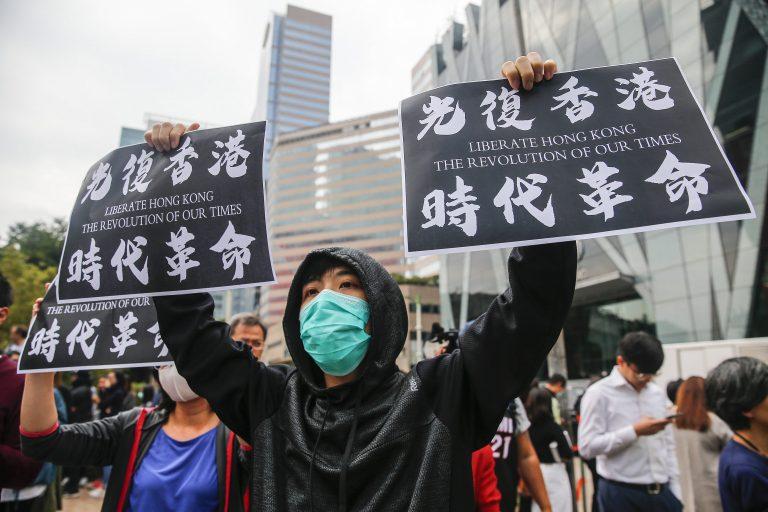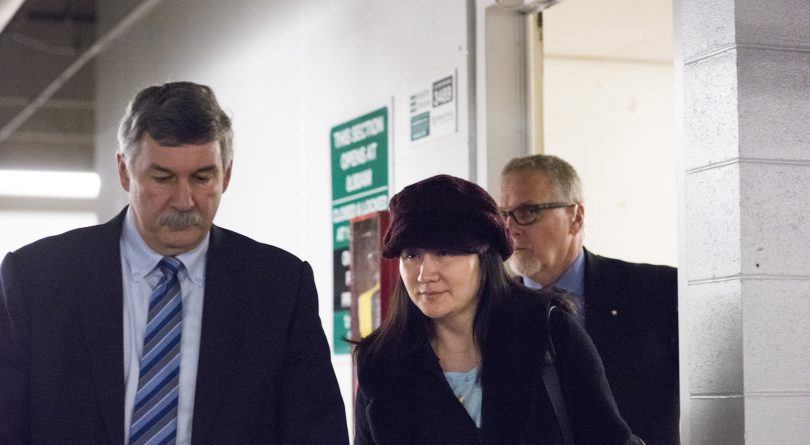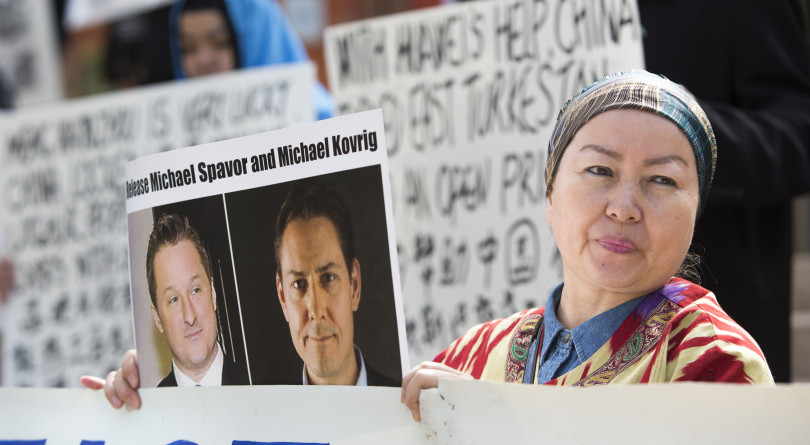The Trudeau government’s high noon moment with Beijing
A Senate motion puts the Liberals at a crossroads. Will they break with their party’s entrenched pro-China lobby? Or reward Beijing’s bullying and hostage-taking?

A lunchtime anti-government rally in Kowloon Bay, Hong Kong (Fazry Ismail/EPA)
Share
A long-overdue parliamentary showdown with the Beijing-friendly wing of the Liberal Party looms ominously next week in a motion before the Senate that calls on Justin Trudeau’s government to sanction a roster of senior Chinese and Hong Kong officials under the Victims of Corrupt Foreign Officials Act.
Given his inclination to bombastic, rule-breaking eruptions, Chinese strongman Xi Jinping should be counted on to opt for vengeful reprisals if the motion proceeds very far through Parliament, and Trudeau’s minority government would find itself reluctantly stumbling towards high noon with Beijing.
A clean break from the grip of the deeply entrenched China lobby would allow Canada to shake itself out of the bizarre foreign-policy paralysis that has enfeebled the Trudeau government ever since the Huawei crisis erupted a year ago this week. It would open up an opportunity to throw off the catastrophic institutional, political and corporate entanglements with China that comprise the defining legacy of the Liberal Party’s approach to Canada-China relations over the past half century.
But it would also leave a welt. There’s no telling how furiously the Beijing regime would respond. It was exactly a year ago last Sunday that Huawei chief financial officer Meng Wanzhou was detained in Vancouver on a U.S Justice Department warrant outlining bank fraud charges arising from Huawei’s alleged evasions of U.S. sanctions in Iran. Chinese officials immediately warned of “grave consequences,” and on Dec. 10 last year they followed through when Canadian diplomat-on-leave Michael Kovrig and entrepreneur Michael Spavor were picked up separately and imprisoned on obviously trumped-up espionage charges.
Beijing’s retaliation continued with embargoes on Canadian canola and pork products, and the death penalty was imposed on two Canadians already convicted and sentenced to jail on drug charges. China’s foreign ministry has kept up a background roar of threats, harangues and propaganda for a full year now. And the Trudeau cabinet continues to waffle in the face of repeated and increasingly dire warnings from leading Canadian, American and Australian intelligence officials that Huawei, Xi’s globe-circling “national champion” telecom giant, poses a grave threat to Canada’s national security.
A decision on whether to allow Huawei a role in Canada’s fifth-generation internet connectivity was initially expected to be made before the October federal election. The Prime Minister’s Office is still kicking that can down the road, even though Huawei has now been deeply implicated in China’s vast surveillance superstructure, most notably in the cruelly invasive eavesdropping, street monitoring and algorithm-driven policing of Muslims in Xinjiang. Hundreds of thousands of Uighurs are imprisoned in Xinjiang’s archipelago of re-education camps and forced-labour complexes, which until recently Beijing insisted didn’t even exist.
By insisting that the case of Kovrig and Spavor will remain Canada’s top priority while quietly advancing its signature policy of expanding trade and deepening ties with China—and by retreating, just as quietly, from initiatives aimed at holding Beijing to account for its serial human rights outrages—the Trudeau government has sent a clear signal to Xi Jinping. Hostage-taking and trade bullying works.
RELATED: Huawei’s Meng Wanzhou: The world’s most wanted woman
The Liberal old guard—including former prime minister Jean Chrétien, former deputy prime minister John Manley and the since-fired ambassador to China, John McCallum—has gone so far as to insinuate that Canada, not China, is in the wrong. Sometimes the argument is that Canada should never have detained Meng in the first place. Sometimes it’s that Beijing is right to expect a replay of the SNC-Lavalin scandal, and the Prime Minister’s Office should arbitrarily interfere in Meng’s extradition proceedings on Meng’s behalf. Sometimes it’s that the Trump administration should be encouraged to short-circuit the U.S. Justice Department prosecution, as Trump himself initially suggested he might, to allow Meng to fly home to Shenzhen.
But unless Canada stands up for the rule of law, and stands up to Beijing’s bullying, it won’t stop, and it will only get worse, William Nee, Amnesty International’s Business and Human Rights Strategy Adviser, told me on Monday.
“Countries like Canada want beneficial access to China, because there’s lots of corporate pressure. You just have to look at what China is prepared to do to retaliate against some countries. Policy makers definitely need to be aware that there are costs associated with the protection of human rights, but by putting it off and not doing it now, things are not going to get better in five or 10 years.
“Things are going to get worse,” Nee said in a telephone interview from Hong Kong. “So there’s a lot to be said for being strong, and really trying to take a principled approach that recognizes that there are going to be costs and you’re willing to pay them. And that’s the best option.”

The Senate motion, developed by the Conservative senators Thanh Hai Ngo and Leo Housakos in close consultation with Hong Kong democracy activists, would target officials directly implicated in the brutally systemic persecution of China’s Muslim minorities, particularly the Uighurs of Xinjiang. But the motion’s immediate sights are set on officials responsible for human rights abuses in Hong Kong, where millions of people have been marching in the streets since last July in a popular democratic insurrection that has sprung up to defend Hong Kong’s autonomy from Beijing’s advancing police-state encroachments.
The Victims of Corrupt Foreign Officials Act is also known as Canada’s Magnitsky law, named after the Moscow lawyer Sergei Magnitsky, who was tortured and murdered in prison on Nov. 16, 2009 after he discovered the largest tax fraud in Russian history. Individuals sanctioned under the law are effectively declared persona non grata in Canada. Their assets are frozen and financial dealings with them are forbidden. Several countries, notably the U.S. and the United Kingdom, have adopted similar Magnitsky laws.
Canada has used the two-year-old law to sanction officials from South Sudan, Russia, Venezuela, Myanmar and Saudi Arabia, but not a single official from China, the most ruthless human rights abuser on earth. It makes no sense, even from a trade perspective—China’s significance as a trading partner is wildly overblown, Ngo says. But still, “China gets a pass. We say we are champions of human rights. We forget when it comes to China. But we have to walk the talk.”
Even though the rule-of-law champion Chrystia Freeland has been replaced as foreign affairs minister by the Beijing-friendly Chrétien protege François-Philippe Champagne, there’s still a fighting chance that the motion to sanction Chinese and Hong Kong officials under the Magnitsky law will pass, Ngo and Housakis say. A number of Liberal-appointed members of the Senate have had quite enough of Trudeau’s acquiescence and capitulation to China, and there’s a good chance the Senate motion could be backed by a majority vote in the House of Commons, now that Liberal MPs are in a minority.
PODCAST: Sergei Magnitsky’s heroic sacrifice: The Power of One, episode two
Last week, Hong Kong’s pro-democracy movement scored a major victory when the Trump administration signed off on a bill that enjoyed overwhelming bipartisan support in the U.S. Congress. The Hong Kong Human Rights and Democracy Act requires an ongoing review of the special tariff-free status Hong Kong enjoys in U.S trade law, which could be brought to an end if Beijing continues to erode Hong Kong’s autonomy.
Before Trump signed off, Cong Peiwu, China’s new ambassador to Canada, was already issuing threats, warning that if Canadian lawmakers got any ideas in their heads about following the example of the U.S. Congress, China would consider it “foreign interference” in Hong Kong, and there would be hell to pay. “If anything happens like this we will certainly have very bad damage in our bilateral relationship and that is not in the interest of Canada,” he said.
On Monday, China declared that American warships would be barred from Hong Kong waters and military flights would be turned away from Hong Kong International Airport. China’s foreign ministry also announced that sanctions would be imposed on several U.S. human rights and international democracy organizations, including the National Endowment for Democracy, Human Rights Watch, the National Democratic Institute, the International Republican Institute, and Freedom House.
“A large amount of facts and evidence have shown that these NGOs have supported anti-China plotters who messed up Hong Kong through various means,” the Chinese foreign ministry declared, adding that “these organizations shall pay the price for what they’ve done.”
What this might mean is a mystery. The worst case scenario would be a directive from the Communist Party that its puppet administration in Hong Kong should replicate Beijing’s 2017 Overseas NGO Management Law, which forced human-rights monitoring organizations in China to either radically scale back their operations or pull up stakes entirely.
RELATED: Who lost China? And how was Canada supposed to win it?
In any case, Freedom House president Michael J. Abramowitz was having none of it on Monday. “Freedom House has worked to uphold democracy and human rights around the world for 78 years. In keeping with that mission, we have stood with the people in Hong Kong who are demanding respect for their freedoms and calling on Beijing to live up to its obligations under the Sino-British Joint Declaration that governed the territory’s 1997 transfer to China. We do not look to the Chinese Communist Party for permission to support such legitimate goals.”
Last weekend, in an opaquely-worded statement provided only to Radio Canada, Foreign Affairs Minister Champagne suggested he would soon be having another look at Canada’s policy on China. “I think we have arrived at a critical moment, strategically, where my role is to bring the parties around the table,” he said. “I think we have to establish, and that will be my responsibility, with Canadian civil society, with business people. . . a framework in which we can have a relationship with China where the interests of Canada stand out, where the fundamental principles, the values will be present.”
But that’s a slightly more obtuse iteration of the gloss the Trudeau government put on its approach to China immediately after the 2015 federal election. The Chinese embassy, the corporate China lobby and Global Affairs bureaucrats were loudly enthusing about moderating a “national conversation” about China. As things turned out, most Canadians were not so easily charmed. A turning away from “business as usual” under the Conservative government of Stephen Harper ended up being a doubling-down on the Liberal old-guard zeal for deeper economic integration with China, a policy John McCallum described succinctly as “more, more, more.”
Senator Housakos, for one, doesn’t read Champagne’s vague statement as a sign of change. “What it means to me is what we’re seeing right now, it’s part and parcel of what we’ve been seeing all along. Buying time, ragging the puck, instead of standing up and showing leadership when it comes to democracy, human rights and the rule of law.”

Housakos pointed to Defence Minister Harjit Sajjan’s controversial statement at the Halifax International Security Forum last month that Canada does not see China as an “adversary.” Housakos also noted the appointment of Dominic Barton as Canada’s new ambassador to China only after Beijing agreed he’d be suitable replacement for McCallum. Barton was appointed in September after a long corporate career devoted mainly to deal-making in China.
“With all due respect, if you look at his background, Mr. Barton looks more like an insider for the Chinese regime than he is an advocate for Canadian values and principles on behalf of our government,” Housakos said. “So, is this government an agent for Chinese interests, or are they there to defend Canadian interests and Canadian values?”
It’s a question that’s worth asking out loud, says Aileen Calverley, a trustee with Hong Kong Watch in the United Kingdom. Until the Two Michaels were kidnapped by China’s shadowy state security apparatus last December, most Canadians were woefully uninformed about China. That’s changing, but it’s taking quite a while for Canadian public opinion to inform federal policy.
“There are people who see China as a business partner, and that’s it,” said Calverley, a Canadian Hongkonger based in London. “Now, there’s greater awareness, but a lot of people still have no idea just how evil China is. They don’t have a good understanding of China at all.”
The first thing Canadians need to understand is that issuing statements calling for dialogue and non-violence, as Canada has done, once in tandem with the United Kingdom and once with the European Union, isn’t really helping.
“Canada likes to claim that it is a leading country for human rights in the world. Canada needs to stand up to China, for Hong Kong, and do things, and not just issue statements,” Calverley said. “The Magnitsky law is one way to go. The Hong Kong government is a puppet of China, and they will not stop what they are doing just because of statements.”